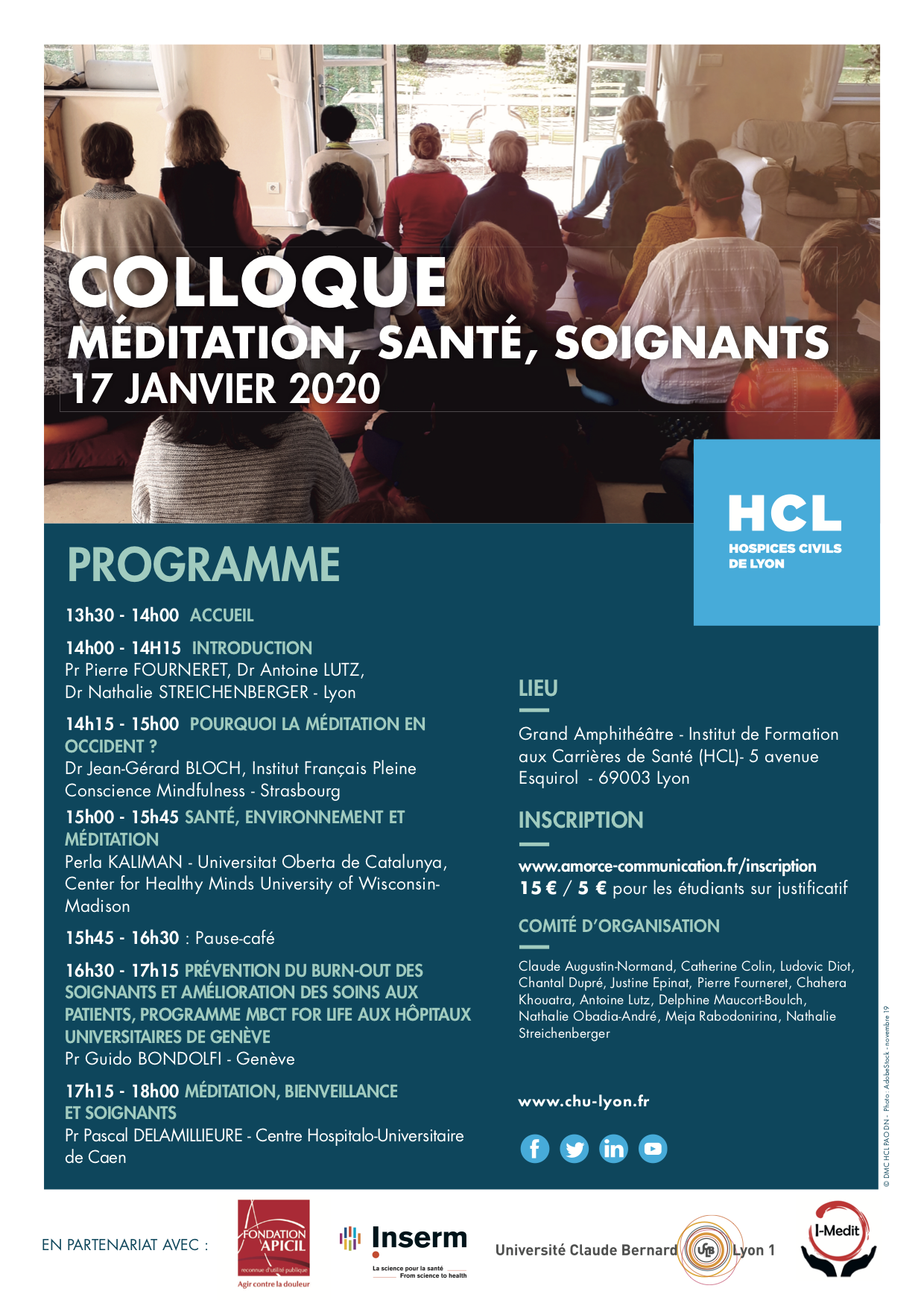Training the Social Brain: Effects of a One-Year Mental Training Study on Brain Plasticity, Wellbeing, Health and Human Prosociality
le 16 octobre de 16h à 17h
Amphithéâtre du CRNL
Centre hospitalier du Vinatier
95 Boulevard Pinel, Bron
In the last decades, plasticity research has suggested that training of mental capacities such as attention, mindfulness, and compassion is effective and leads to changes in brain functions associated with increases in positive affect, pro-social behavior, and better health.
I will introduce the ReSource Project, a large-scale multi-methodological one-year secular mental training program. Participants were trained in three separate modules allowing us to distinguish effects based on training of a) attention and interoceptive body awareness (Presence), b) care, compassion, and emotion-regulation (Affect), and c) Theory of Mind and meta-cognitive awareness (Perspective). We assessed data from more than 300 training and control subjects, with over 90 measures including subjective measures, questionnaires, event-sampling data, a variety of behavioral, brain, physiological and biological data. I will present evidence of training-module specific changes in structural brain plasticity, stress reduction, increases in attention, compassion and subjective well-being, as well as body awareness and prosocial behavior. These findings will be discussed in relation to their meaning for models of social cognition, plasticity research and contemplative studies in general, and their importance to initiate societal change.
 Tania Singer is the scientific head of the Social Neuroscience Lab of the Max Planck Society in Berlin. After doing her PhD in Psychology at the Max Planck Institute for Human Development in Berlin, she became a Post-doctoral Fellow at the same institution, at the Wellcome Department of Imaging Neuroscience, and at the Institute of Cognitive Neuroscience in London. In 2006, she first became Assistant Professor and later Inaugural Chair of Social Neuroscience and Neuroeconomics as well as Co-Director of the Laboratory for Social and Neural Systems Research at the University of Zurich. Between 2010 and 2018 Tania Singer was the director of the department of Social Neurosciences at the Max Planck Institute of Cognitive and Human Development in Leipzig. Her research focus is on the hormonal, neuronal, and developmental basis of human sociality, empathy and compassion, and their malleability through mental training. She is the principal investigator of a large-scale, nine-month longitudinal meditation based mental training study, The ReSource Project, and investigates together with Dennis Snower how psychology can inform new models of Caring Economics. Tania Singer is author of more than 150 scientific articles and book chapters and edited together with Mathieu Ricard the two books Caring Economics (2015) and Power and Care (2019).
Tania Singer is the scientific head of the Social Neuroscience Lab of the Max Planck Society in Berlin. After doing her PhD in Psychology at the Max Planck Institute for Human Development in Berlin, she became a Post-doctoral Fellow at the same institution, at the Wellcome Department of Imaging Neuroscience, and at the Institute of Cognitive Neuroscience in London. In 2006, she first became Assistant Professor and later Inaugural Chair of Social Neuroscience and Neuroeconomics as well as Co-Director of the Laboratory for Social and Neural Systems Research at the University of Zurich. Between 2010 and 2018 Tania Singer was the director of the department of Social Neurosciences at the Max Planck Institute of Cognitive and Human Development in Leipzig. Her research focus is on the hormonal, neuronal, and developmental basis of human sociality, empathy and compassion, and their malleability through mental training. She is the principal investigator of a large-scale, nine-month longitudinal meditation based mental training study, The ReSource Project, and investigates together with Dennis Snower how psychology can inform new models of Caring Economics. Tania Singer is author of more than 150 scientific articles and book chapters and edited together with Mathieu Ricard the two books Caring Economics (2015) and Power and Care (2019).

Conférence débat gratuite (sur inscription)
Animée par le docteur Antoine LUTZ, chercheur au Centre de Neurosciences de Lyon
et Titi TRAN, formatrice en méditation à Paris.
La méditation trouve progressivement sa place dans le domaine de la santé. La valeur thérapeutique de la méditation est établie dans les troubles de l’humeur et de la douleur chronique. Cette approche complète la réponse pharmacologique.
Cependant, les mécanismes mentaux et neurophysiologiques sous-jacents ces pratiques méditatives commencent à peine à être explorés. Le docteur Antoine Lutz, chercheur en neurosciences et Titi Tran, formatrice, investissent depuis de nombreuses années le champ de la méditation pour comprendre et diffuser sa pratique.
Mardi 8 octobre de 18h30 à 20h, accueil à partir de 18h.
Amphithéâtre A. Mérieux
Université Catholique de Lyon
10, place des archives - Lyon 2ème
Accès TCL : Arrêt PERRACHE, métro Ligne A et tram T2.
Plus d'informations et inscriptions sur le site de la fondation APICIL : http://www.fondation-apicil.org/inscriptions_meditation_2019.php


 Tania Singer is the scientific head of the Social Neuroscience Lab of the Max Planck Society in Berlin. After doing her PhD in Psychology at the Max Planck Institute for Human Development in Berlin, she became a Post-doctoral Fellow at the same institution, at the Wellcome Department of Imaging Neuroscience, and at the Institute of Cognitive Neuroscience in London. In 2006, she first became Assistant Professor and later Inaugural Chair of Social Neuroscience and Neuroeconomics as well as Co-Director of the Laboratory for Social and Neural Systems Research at the University of Zurich. Between 2010 and 2018 Tania Singer was the director of the department of Social Neurosciences at the Max Planck Institute of Cognitive and Human Development in Leipzig. Her research focus is on the hormonal, neuronal, and developmental basis of human sociality, empathy and compassion, and their malleability through mental training. She is the principal investigator of a large-scale, nine-month longitudinal meditation based mental training study, The ReSource Project, and investigates together with Dennis Snower how psychology can inform new models of Caring Economics. Tania Singer is author of more than 150 scientific articles and book chapters and edited together with Mathieu Ricard the two books Caring Economics (2015) and Power and Care (2019).
Tania Singer is the scientific head of the Social Neuroscience Lab of the Max Planck Society in Berlin. After doing her PhD in Psychology at the Max Planck Institute for Human Development in Berlin, she became a Post-doctoral Fellow at the same institution, at the Wellcome Department of Imaging Neuroscience, and at the Institute of Cognitive Neuroscience in London. In 2006, she first became Assistant Professor and later Inaugural Chair of Social Neuroscience and Neuroeconomics as well as Co-Director of the Laboratory for Social and Neural Systems Research at the University of Zurich. Between 2010 and 2018 Tania Singer was the director of the department of Social Neurosciences at the Max Planck Institute of Cognitive and Human Development in Leipzig. Her research focus is on the hormonal, neuronal, and developmental basis of human sociality, empathy and compassion, and their malleability through mental training. She is the principal investigator of a large-scale, nine-month longitudinal meditation based mental training study, The ReSource Project, and investigates together with Dennis Snower how psychology can inform new models of Caring Economics. Tania Singer is author of more than 150 scientific articles and book chapters and edited together with Mathieu Ricard the two books Caring Economics (2015) and Power and Care (2019).
